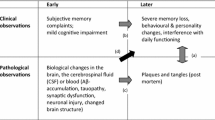Abstract
Boenink argues that responsible biomedical research should at least address legitimate and urgent needs of those suffering from the disease, and asks whether research on molecular biomarkers for Alzheimer’s disease (AD) satisfies this criterion. To this end, she investigates how the interrelation of biological and clinical phenomena related to AD is conceptualized, pursued, and shaped in (1) discourse on biomarkers in general; (2) scientific literature on AD biomarkers and new guidelines for diagnosing the disease; and (3) the design of a specific AD biomarker research project. Boenink concludes that patients’ and caregivers’ needs easily disappear from view while exploring the complex relations between biology and clinic, and suggests that to stimulate responsible AD biomarker research, both ‘epistemic’ and ‘translational’ responsibility need to be enhanced.
Access this chapter
Tax calculation will be finalised at checkout
Purchases are for personal use only
Similar content being viewed by others
References
Biomarkers Definition Working Group. 2001. Biomarkers and Surrogate Endpoints: Preferred Definitions and Conceptual Framework. Clinical Pharmacology and Therapeutics 69(3): 89–95.
Boenink, M. 2013. Van confectie naar maatkleding? ‘Personalized medicine’ en het onderscheid normaal – pathologisch. In Komt een filosoof bij de dokter. Denken over gezondheid en zorg, eds. M. Schermer, M. Boenink, and G. Meijnen. Amsterdam: Boom.
Boenink, M. 2016. Disease in the Era of Genomic and Molecular Medicine. In Bloomsbury Companion to Contemporary Philosophy of Medicine, ed. J. Marcum. London: Bloomsbury.
Canguilhem, G. 1991. The Normal and the Pathological. New York: Zone Books.
Code, L. 1987. Epistemic Responsibility. Hanover: University Press of New England.
Dubois, B., H.F. Feldman, C. Jacova, S.T. DeKosky, P. Barberger-Gateau, J. Cummings, A. Delacourte, et al. 2007. Research Criteria for the Diagnosis of Alzheimer’s Disease: Revising the NINCDS–ADRDA Criteria. The Lancet Neurology 6(8): 734–746.
Dubois, B., H.F. Feldman, C. Jacova, J. Cummings, S.T. DeKosky, P. Barberger-Gateau, A. Delacourte, et al. 2010. Revising the Definition of Alzheimer’s Disease: A New Lexicon. The Lancet Neurology 9(11): 1118–1127.
European Science Foundation. 2012. Personalised Medicine for the European Citizen. Towards More Precise Medicine for the Diagnosis, Treatment and Prevention of Disease (iPM). Strasbourg: European Science Foundation.
Handels, R.L.H. 2014. Health Technology Assessment of Diagnostic Strategies for Alzheimer’s Disease. Maastricht: PhD thesis, University of Maastricht.
Handels, R.L.H., M.A. Joore, A. Tran-Duy, A. Wimo, C.A. Wolfs, F.R. Verhey, and J.L. Severens. 2015. Early Cost-Utility Analysis of General and Cerebrospinal Fluid-Specific Alzheimer’s Disease Biomarkers for Hypothetical Disease-Modifying Treatment Decision in Mild Cognitive Impairment. Alzheimer’s & Dementia 11(8): 896–905.
Humpel, C. 2011. Identifying and Validating Biomarkers for Alzheimer’s Disease. Trends in Biotechnology 29(1): 26–32.
Jack, C.R. Jr., M.S. Albert, D.S. Knopman, G.M. McKhann, R.A. Sperling, M.C. Carillo, B. Thies. et al. 2011. Introduction to the Recommendations from the National Institute on Aging-Alzheimer’s Association Workgroups on Diagnostic Guidelines for Alzheimer’s Disease. Alzheimer’s and Dementia 7(3): 257–262.
Kitwood, T. 1997. Dementia Reconsidered. Buckingham: Open University Press.
LeARN. 2007. Project Description LeARN. Eindhoven: Centre for Translational Molecular Medicine.
Lee, H.G., G. Casadeus, X. Zhu, A. Takeda, G. Perry, and M.A. Smith. 2004. Challenging the Amyloid Cascade Hypothesis: Senile Plaques and Amyloid-β as Protective Adaptations to Alzheimer Disease. Annals of the New York Academy of Sciences 1019(1): 1–4.
Lock, M. 2013. The Alzheimer Conundrum: Entanglements of Dementia and Aging. Princeton: Princeton University Press.
Moser, I. 2011. Dementia and the Limits to Life: Anthropological Sensibilities, STS Interferences, and Possibilities for Action in Care. Science, Technology & Human Values 36(5): 704–722.
National Academy of Sciences. 2011. Toward Precision Medicine: Building a Knowledge Network for Biomedical Research and a New Taxonomy of Disease. Washington, DC: National Academics Press.
Petersen, R.C., G.E. Smith, S.C. Waring, R.J. Ivnik, E.G. Tangalos, and E. Kokmen. 1999. Mild Cognitive Impairment: Clinical Characterization and Outcome. Archives of Neurology 56(3): 303–308.
Petersen, R.C. 2009. Mild Cognitive Impairment: Ten Years Later. Archives of Neurology 66(12): 1447–1455.
Pimplikar, S.W. 2009. Reassessing the Amyloid Cascade Hypothesis of Alzheimer’s Disease. The International Journal of Biochemistry & Cell Biology 41(6): 1261–1268.
Richard, E., B. Schmand, P. Eikelenboom, R.G. Westendorp, and W.A. Van Gool. 2012. The Alzheimer Myth and Biomarker Research in Dementia. Journal of Alzheimer’s Disease 31(Suppl. 3): s203–s209.
Ronald, T., and National Institute on Aging Working Group. 1998. Consensus Report of the Working Group on “Molecular and Biochemical Markers of Alzheimer’s Disease”. Neurobiology of Aging 19(2): 109–116.
Savva, G.M., S.B. Wharton, P.G. Ince, G. Forster, F.E. Matthews, and C. Brayne. 2009. Age, Neuropathology, and Dementia. New England Journal of Medicine 360(22): 2302–2309.
Snowdon, D.A. 1997. Aging and Alzheimer’s Disease: Lessons from the Nun Study. The Gerontologist 37(2): 150–156.
Sunderland, T., H. Hampel, M. Takeda, K.T. Putnam, and R.M. Cohen. 2006. Biomarkers in the Diagnosis of Alzheimer’s Disease: Are We Ready? Journal of Geriatric Psychiatry and Neurology 19(3): 172–179.
Tutton, R. 2014. Genomics and the Reimagining of Personalized Medicine. Farnham: Ashgate.
Whitehouse, P.J., and D. George. 2008. The Myth of Alzheimer’s: What You Aren’t Being Told About Today’s Most Dreaded Diagnosis. New York: St. Martin’s Press.
Acknowledgements
This chapter is based on research performed in the project ‘Responsible early diagnostics for Alzheimer’s Disease’, which was funded by the Dutch Organization for Scientific Research (NWO) under its Responsible Innovation programme. I want to thank the researchers involved in the LeARN-project for their cooperation. In addition, thanks to Anna Laura van der Laan, Harro van Lente, and Ellen Moors for their feedback on earlier drafts of the chapter.
Author information
Authors and Affiliations
Editor information
Editors and Affiliations
Copyright information
© 2016 The Author(s)
About this chapter
Cite this chapter
Boenink, M. (2016). Biomarkers for Alzheimer’s Disease: Searching for the Missing Link Between Biology and Clinic. In: Boenink, M., van Lente, H., Moors, E. (eds) Emerging Technologies for Diagnosing Alzheimer's Disease. Health, Technology and Society. Palgrave Macmillan, London. https://doi.org/10.1057/978-1-137-54097-3_4
Download citation
DOI: https://doi.org/10.1057/978-1-137-54097-3_4
Published:
Publisher Name: Palgrave Macmillan, London
Print ISBN: 978-1-137-54096-6
Online ISBN: 978-1-137-54097-3
eBook Packages: Social SciencesSocial Sciences (R0)




